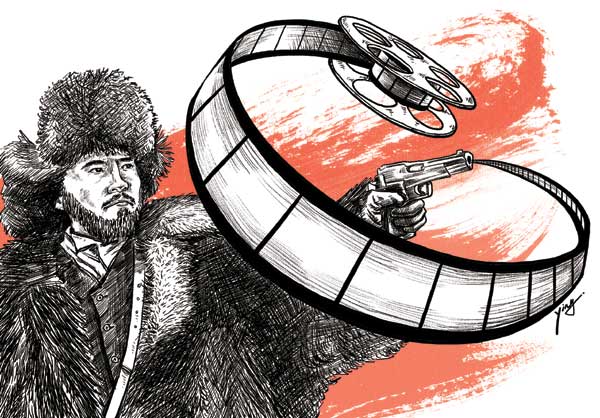当前位置: Language Tips> Columnist 专栏作家> Raymond Zhou

Before Tsui Hark's new film came out at year's end, I, like macritics, was expecting a fiasco. How likely could it be that a filmmaker reared in a freewheeling capitalist system would be able to adapt a "revolutionary" work? The values would clash violently, I presumed.
在徐克的新电影年底上映之前,我,正像其他的评论者一样,预期这会是一场惨败。一个在随心所欲的资本主义制度下长大的电影制片人怎么可能成功驾驭一部“革命”作品?一定会有激烈的价值观冲突,我想。
Surprise, surprise! The Taking of Tiger Mountain turned out to be a runaway hit, not only at the box office, to the tune of 800-plus million yuan (more than $128 million), but by word-of-mouth. The Hong Kong director has accomplished the near impossible-he has brought new relevance to a relic of the "cultural revolution" (1966-76).
惊喜,惊喜!没想到《智取威虎山》竟然大获成功,不仅票房收入高达八亿多元人民币,口碑也相当不错。这个香港导演完成了一件几乎不可能的事——他将一个“文化大革命”时期的遗物赋予了新的意义。
To understand what Tsui has done, one has to have a firm grasp of China's cultural scene some 40 years ago. To put it bluntly, there was no culture as most would see it today. Almost all artists were sent into exile or labor camps. The whole population subsisted on only a dozen shows, which were filmed and screened repeatedly across the nation.
要想明白徐所做的意义,需要对大约40年前中国的文化生活有稳固的了解。说白了,那时候没有像现在一样大多数人所见到的文化。几乎所有的文艺工作者都被流放或者发配到劳改营里劳动。全国人民能观看到的只有十几个节目,它们被拍成影片在全国各地反复放映。
There is a lot of misunderstanding about the so-called Eight Model Operas. First of all, they were not born during the "cultural revolution"; most had their first incarnations before 1966. They were handpicked by Jiang Qing (Madame Mao), who essentially served as the producer, or even director, giving specific instructions on every detail, during the metamorphosis into what people later saw en masse. Even Mao himself had a hand in changing the ending of Shajiabang-by supplanting a subterfuge with a direct attack on the enemy. There was also lots of shuffling in casting as renowned performers became the targets of denunciation and were hastily replaced with younger peers.
人们对于所谓的“八个样板戏”有不少误解。首先,它们并不是产生于文革时期,大多数作品在1966年之前都已经基本成型了。江青(毛泽东的夫人)精心挑选了它们,并基本上担任了制片人甚或是导演,在作品蜕变为人们后来集体观看到的版本的过程中,她对表演的每个细节都做了明确的指导。甚至毛泽东本人也参与了对《沙家浜》结局的修改——用对敌人的直接攻击取代了计谋。演员阵容也大变,因为著名的表演者在当时都成了被批斗的对象,不得不仓促地重新选一批年轻演员。
Suffice it to say, only when the eight shows were filmed-some more than once-was it possible for them to gain a nationwide audience. They were re-adapted for the stage by local performing ensembles, often imitating every move of the screen version. Since they were the staple among a dozen films still permitted for public consumption and received numerous screenings, most people could recite every line.
不用说,只有当这八个节目被拍成电影——有的不止被拍了一次——它们才有可能被全国人民都看到。地方的表演团队改编这些作品时,往往会模仿荧幕上的每一个动作,然后在舞台上演出。由于这些作品是被允许公开放映的十几个电影中的主要节目,被放映了无数次,大部分群众甚至记住了每一句台词。
Second, the Eight Model Operas were not all Peking Operas. Two of them were ballets: The White-Haired Girl and Red Detachment of Women, often shown to foreign visitors as they did not need translation. Not all of them were equally popular. Raid on the White Tiger Regiment, an opera on fighting US soldiers in Korea, was so low on the public radar that another opera, The Azalea Mountain, from a later batch of model operas, was often mistaken for one of the original eight.
第二,“八个样板戏”并不都是京剧。有两个是芭蕾舞剧:《白毛女》和《红色娘子军》。因为不需要翻译,它们经常用于向外宾表演。“八个样板戏”也不是一样地受欢迎。《奇袭白虎团》,这部讲述朝鲜战争中打击美军的京剧,在群众中反响过低,以至于从后一批样板戏中脱颖而出的《杜鹃山》往往被认为是最初的八剧之一。
Third, these works were never officially banned after the "cultural revolution". The public was so sick and tired of them after a decade of extremely limited entertainment (even the word "entertainment" was frowned upon and the more politically correct "propaganda" was preferred), that they took to the plethora of music choices suddenly available. But one decade later, around the late 1980s, some started to feel nostalgia for the forgotten operas. Arias and scenes reappeared, soon followed by fully staged productions. But only those portraying pre-1949 stories made a comeback because the others run counter to existing government policies, like entrepreneurs being public enemies, as shown in the operas.
第三,文化大革命之后,这些作品从来没有被正式禁止过。在遭受长达十年极其有限的娱乐禁锢后(甚至是“娱乐”这个词在当时都会让人看不惯,而在政治上更正确的另一个词“宣传”是首选),人们已经非常厌烦这些作品了,转而大量享受突然之间遍地都是的音乐。但十年后,在20世纪80年代后期,一些人开始怀念起那些被遗忘的样本剧。熟悉的调子和戏剧场面重新出现,紧接着便有了完整版的表演。但是只有那些描述1949年之前事迹的故事重返舞台,因为其余的作品主题违背了现有的政府政策,如有的京剧会传达出企业家是民众公敌之类的信息。
The debate on the nature of the model operas has since flared intermittently. Some argue they were the products of the revolution and convey its excesses and its ideology. Others contend that they embody the collective memory of a whole generation. Besides, we should not give all the credit to Jiang Qing. Many top artists put their creativity into them.
自此以后,关于样板戏性质的争论也开始断断续续地爆发。一些人认为样板戏是文化大革命的产物,传达的是文化大革命的极端和它的意识形态。另一些人则认为样板戏是整整一代人的集体回忆。此外,我们也不应该把所有的成就都归功于江青,许多顶尖的艺术家们也贡献了他们的创造力。
Jiang would pick filmmakers, who were released from detention and were shown films made in Hollywood-in a time when only a few top leaders had such access. They were supposed to learn Hollywood's art and craft and use it in filming the operas. Those artists had flourishing careers either before or after the revolution.
江青会挑选一些电影制片人,将他们从拘留中释放出来,并向他们展示好莱坞制作的电影——在那个时候,只有少数高层领导有这样的机会。他们被要求学习好莱坞的电影制作艺术和技巧并应用于拍摄戏剧。这些艺术家在文化大革命之前或之后职业发展都很好。
上一篇 : 周黎明:忠于现实才是大智慧
下一篇 : 国人的隐私和社会包容度
关注和订阅


电话:8610-84883645
传真:8610-84883500
Email: languagetips@chinadaily.com.cn